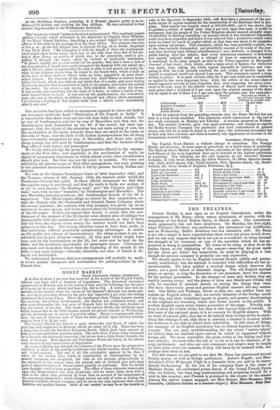Our attention has been called to statements opposed to views
set forth in out last paper under the head " Obstruction of the Transit to India." It is represented, that there were not two but four mails in each month, two by way of Southampton and two by way of Marseilles, and that one, the Southampton mail despatched on the 3d of the month, has been sup- pressed; that the object of the alteration was not mere saving of cost, but the acceleration of the mails, whereby three days are saved in the route on this side of Suez; that the bulk of the Indian correspondence has all along been voluntarily despatched by way of Marseilles, and those who prefer cheap postage can still send by Southampton; and that the business of the Post-office is with letters, not passengers.
We freely acknowledge the great improvements effected in the manage- ment of the Post-office, and especially in the acceleration of mails; an object of paramount importance, to which almost every other consideration should give way. But that was not the point in question. We were not criticizing the general scope of Post-office management, but were pointing to one practical inconvenience which is felt by persons having Indian con- nexions.
We refer to Sir Charles Trevelyan's letter of 30th September 1847, and the Treasure minute of 4th January 1848, the warrant under which the Postmaster-General has acted. In those official documents we find that the popular usage is sanctioned, and that the mails to India are spoken of as two in each month, "the Bombay mail," and "she Calcutta and China mail," each with its two " branches," by Southampton and Marseilles. The two Marseilles branches continue: the Southampton branch of the 3d is suppressed. The official papers allege no reason for that suppression, ex- cept the dispute with the Peninsular and Oriental Steam Company about the money payment: the contract with that company was given up on an endeavour to save money, and in the altered plans the Southampton steamer of the 3d ceases. It does not appear that money is saved, that the con- tinuance of the steamer of the 3d (under some altered plan of sailing) was Incompatible with the acceleration of the correspondence, or that if there had not been the dispute about money the steamer would not have been going on to this day. The change therefore seems to have been made, in that particular, without practically compensating advantages. It entails on the public two classes of inconvenience: the cheap postage is not ac- celerated, but in part delayed—namely, all that part which might have been bent by the Southampton on the 3d, but must now be kept for the 20th; and the incidental opportunity for passengers ceases. Correspond- ents must now keep their letters from the beginning of the month to the 20th, or pay more postage: virtually, therefore, one class of letters is de- layed, not accelerated.
We understand, however, that new arrangements will probably be made, to secure greater cheapness and convenience for correspondents by the French line.


























 Previous page
Previous page